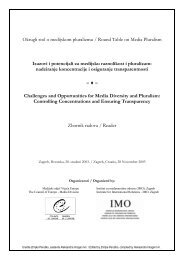almanac on security sector oversight in the Western Balkans
almanac on security sector oversight in the Western Balkans
almanac on security sector oversight in the Western Balkans
You also want an ePaper? Increase the reach of your titles
YUMPU automatically turns print PDFs into web optimized ePapers that Google loves.
c<strong>on</strong>trol and oversee <strong>the</strong> work of executive actors. Statutory <strong>security</strong> actors are also<br />
under <strong>the</strong>ir jurisdicti<strong>on</strong>. 207 Bosnia and Herzegov<strong>in</strong>a went even fur<strong>the</strong>r to establish a<br />
special <strong>in</strong>stituti<strong>on</strong> of <strong>the</strong> ombudsman for <strong>the</strong> protecti<strong>on</strong> of human rights of local military<br />
pers<strong>on</strong>nel.<br />
The f<strong>in</strong>d<strong>in</strong>gs of <strong>the</strong> case studies <strong>in</strong> this volume <strong>in</strong>dicate that <strong>the</strong> nati<strong>on</strong>al military, police<br />
and <strong>security</strong> <strong>in</strong>telligence elites <strong>in</strong> <strong>the</strong> regi<strong>on</strong>, as well as <strong>the</strong>ir subord<strong>in</strong>ates, accept<br />
all key norms and c<strong>on</strong>sequences of electoral democracy. They will<strong>in</strong>gly subord<strong>in</strong>ate<br />
<strong>the</strong>mselves to legal authorities and civilian leadership. In do<strong>in</strong>g so, <strong>the</strong> elites seem to<br />
have retired permanently from <strong>the</strong> public political scene, mak<strong>in</strong>g <strong>the</strong> state <strong>security</strong><br />
<strong>in</strong>stituti<strong>on</strong>s now formally depoliticised. It is also undeniable that civilian authorities <strong>in</strong><br />
<strong>the</strong>se countries fully exercise <strong>the</strong>ir jurisdicti<strong>on</strong> over <strong>the</strong> state <strong>security</strong> forces.<br />
Never<strong>the</strong>less, for a def<strong>in</strong>itive assessment of <strong>the</strong> <strong>Western</strong> Balkan countries’ progress <strong>in</strong><br />
SSR and <strong>in</strong> secur<strong>in</strong>g <strong>the</strong> accountability of statutory <strong>security</strong> actors, <strong>the</strong> role that <strong>the</strong> EU,<br />
NATO and <strong>the</strong> USA played, and still play, <strong>in</strong> <strong>the</strong> regi<strong>on</strong> should be taken <strong>in</strong>to account.<br />
The first phase of <strong>the</strong>ir military and political <strong>in</strong>volvement was ended with <strong>the</strong> prohibiti<strong>on</strong><br />
of war and <strong>the</strong> impositi<strong>on</strong> of peace. The result was a changed local <strong>security</strong> c<strong>on</strong>text<br />
and <strong>the</strong> establishment of c<strong>on</strong>diti<strong>on</strong>s for a gradual transformati<strong>on</strong> of <strong>the</strong> <strong>Western</strong><br />
<strong>Balkans</strong> from a c<strong>on</strong>flict z<strong>on</strong>e <strong>in</strong>to a <strong>security</strong> regime. The sec<strong>on</strong>d phase <strong>in</strong>volved overall<br />
support for <strong>the</strong> normalisati<strong>on</strong> and stabilisati<strong>on</strong> of <strong>the</strong>se countries as well as <strong>the</strong>ir <strong>in</strong>itial<br />
democratisati<strong>on</strong>. Support arrived <strong>in</strong> <strong>the</strong> form of advisory assistance and d<strong>on</strong>ati<strong>on</strong>s<br />
for <strong>security</strong> <strong>sector</strong> reform, <strong>in</strong>clud<strong>in</strong>g reform of exist<strong>in</strong>g <strong>in</strong>stituti<strong>on</strong>s. The efficacy and<br />
efficiency of support was first secured, and later c<strong>on</strong>siderably enhanced, by <strong>the</strong> policy<br />
of c<strong>on</strong>diti<strong>on</strong>ality <strong>in</strong> those countries prepar<strong>in</strong>g for NATO or EU membership.<br />
These endeavours brought many benefits – ec<strong>on</strong>omic, political and <strong>security</strong> – to <strong>the</strong><br />
regi<strong>on</strong>. However, <strong>the</strong> countries’ rul<strong>in</strong>g elites benefited most. The policy of c<strong>on</strong>diti<strong>on</strong>ality,<br />
however arbitrary it may have been, provided authorities with an alibi for mak<strong>in</strong>g<br />
risky changes <strong>in</strong> <strong>the</strong> <strong>security</strong> <strong>sector</strong>. The focus <strong>on</strong> meet<strong>in</strong>g EU and/or NATO standards<br />
resulted <strong>in</strong> hypocrisy by political and <strong>security</strong> elites. They dealt mostly with <strong>the</strong> reorganisati<strong>on</strong><br />
and modernisati<strong>on</strong> of <strong>the</strong>ir respective <strong>in</strong>stituti<strong>on</strong>s, and much less with<br />
radical reform. For this reas<strong>on</strong>, <strong>the</strong>y found it much more important to <strong>in</strong>troduce new<br />
rules and <strong>in</strong>stituti<strong>on</strong>s than to c<strong>on</strong>sistently implement <strong>the</strong> adopted laws or to improve<br />
<strong>the</strong> democratic capacities of <strong>the</strong> new <strong>in</strong>stituti<strong>on</strong>s. It is <strong>the</strong>refore not surpris<strong>in</strong>g that occasi<strong>on</strong>ally<br />
foreign models and soluti<strong>on</strong>s were simply copied, 208 as some authors of <strong>the</strong><br />
case studies observed. This is evident, for example, <strong>in</strong> <strong>the</strong> <strong>in</strong>discrim<strong>in</strong>ate <strong>in</strong>clusi<strong>on</strong> of<br />
NATO and US discourse <strong>on</strong> terrorism <strong>in</strong> nati<strong>on</strong>al <strong>security</strong> strategies. The result is that<br />
terrorism is perceived as <strong>on</strong>e of <strong>the</strong> major threats to nati<strong>on</strong>al <strong>security</strong> <strong>in</strong> <strong>the</strong> majority<br />
of <strong>Western</strong> <strong>Balkans</strong> countries. The author’s impressi<strong>on</strong> is that read<strong>in</strong>ess for membership<br />
<strong>in</strong> NATO – particularly if it is supported by send<strong>in</strong>g <strong>the</strong> troops to Afghanistan<br />
207 The C<strong>on</strong>stituti<strong>on</strong> of <strong>the</strong> Republic of Serbia (article 138) stipulates that <strong>the</strong> President of <strong>the</strong> Republic<br />
is exempt from such c<strong>on</strong>trol although he commands <strong>the</strong> army <strong>in</strong> war and peacetime.<br />
208 This is illustrated by <strong>the</strong> uncritical adopti<strong>on</strong> of <strong>the</strong> NATO c<strong>on</strong>cept of civil-military relati<strong>on</strong>s, which is<br />
primarily <strong>in</strong>tended for <strong>the</strong> executi<strong>on</strong> of occupati<strong>on</strong>al power, given <strong>the</strong> fact that it was tailored to serve<br />
<strong>the</strong> purposes of NATO missi<strong>on</strong> <strong>in</strong> Afghanistan and Iraq under US leadership.<br />
226



